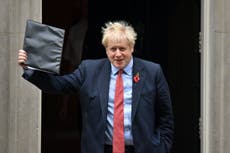The Russia report deserves a far better response from the UK government
The report on Russian hostile action against the UK is a measured and weighty assessment of potential threats to democracy
The report on Russia by the parliamentary Intelligence and Security Committee (ISC), finally published last week, contains no new revelations but is an authoritative reminder that Russia poses a long-term challenge to core UK interests. Although it applauds important aspects of the government’s performance, it also makes trenchant criticisms and offers a series of policy proposals.
The ISC report examines three Russia-related threats. First, it describes Russia’s cyber-related capabilities as “an immediate and urgent threat” to UK national security.
Second, the report looks at the potential threat to the UK’s political system from Russian disinformation and influence. While judging that the integrity of UK elections is broadly secure, it suggests that because government departments view the issue as a hot potato, no organisation seems to be in overall charge; it recommends that operational responsibility for protecting democratic processes should rest primarily with the security service (MI5).
It highlights the importance of preventing the exploitation of social media platforms by hostile state actors. The ISC notes that there has been no official investigation of possible Russian interference in the 2016 EU referendum, an omission that should be corrected.
Third, the report discusses the threat posed by certain Russians in the UK. Mentioning London’s reputation as a “laundromat” for illicit finance, it warns that business can be “a means for broad Russian influence in the UK”. It sets out ways to subject these relationships to closer scrutiny.
The report says bracing things about UK policymaking. Until recently, the government “badly underestimated the Russian threat and the response it required.” The intelligence agencies “took their eye off the ball” and are playing “catch-up”. Referring to “a plethora of plans and strategies”, the report underlines the need for efficient and streamlined policy prioritisation.
The ISC does not get everything right. The UK has been far too lax in welcoming dubious financial flows from Russia (and other countries), but it is debatable whether it plays host to “a lot of Russians with very close links to Putin”. And it is regrettable that the ISC seems to have canvassed just five non-government witnesses.
Nevertheless, the report is an important contribution to the policy debate. Unfortunately, the government’s response to it is not.
The government blocked publication of the report for several months. It has not convincingly explained why, inviting speculation that ministers were hiding something.
Much of the government’s written response is uninformative and defensive. Several passages appear simply to reiterate official positions. Some of the ISC’s recommendations are simply not addressed.
Most disappointing is the government’s refusal to examine whether Russia interfered in the 2016 EU referendum – because there is “no evidence of successful interference”. This circular argument jars with the claim that Russia almost certainly did interfere in the 2019 general election and the statement that “any attempt to interfere in our democratic processes is completely unacceptable”. As the ISC notes, even if an investigation concluded that interference in the referendum was negligible, this would give reassurance about the safety of the UK’s democratic processes.
Other parts of the government’s written response come across as complacent. There is no substantive answer to the ISC’s judgement that, under the current Russian leadership, it is “unrealistic” to envisage a more cooperative bilateral relationship. Nor is there sufficient acknowledgement of the potentially grave damage being done to the UK’s security and standing by the laundering of dirty money from Russia (and other countries) through the City of London.
The Russia report deserves better. As the committee points out, “our democracy is intrinsic to our country’s success and wellbeing”. A feature of a healthy, confident democracy is the readiness of those in power to be held properly to account, to engage in forthright discussion and to be open to constructive criticism. The government’s response to the ISC report does precious little to strengthen the resilience of the very democratic system that Russia seeks to undermine.
Russian decision-makers are unlikely to lose much sleep over the report and the UK government’s response. What they will take notice of are the government’s actions – and whether these really do match its rhetoric.
Duncan Allan is an associate fellow for Chatham House’s Russia and Eurasia programme, and a former member of the Foreign Office’s research analyst cadre.






Join our commenting forum
Join thought-provoking conversations, follow other Independent readers and see their replies